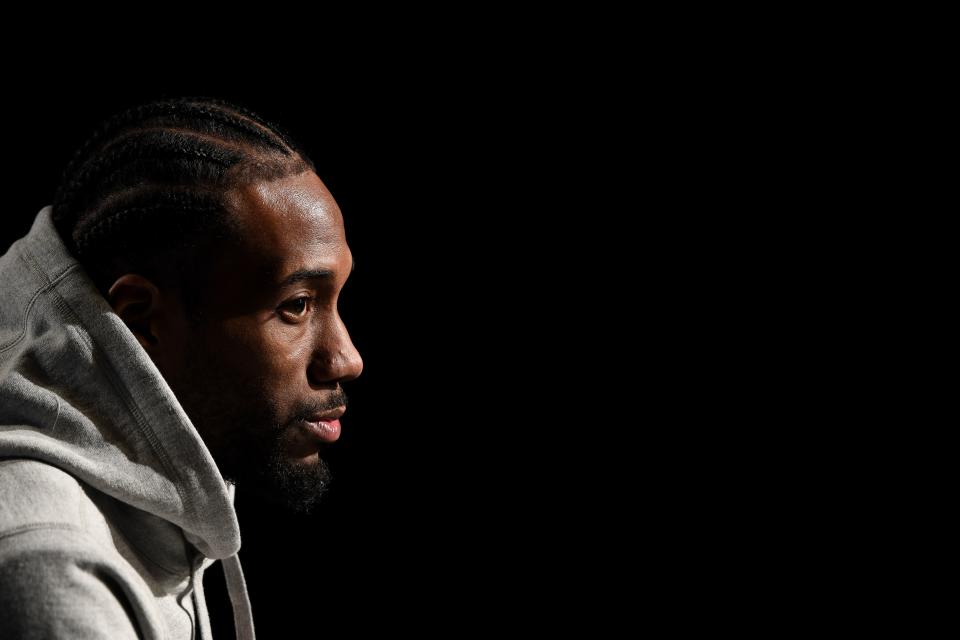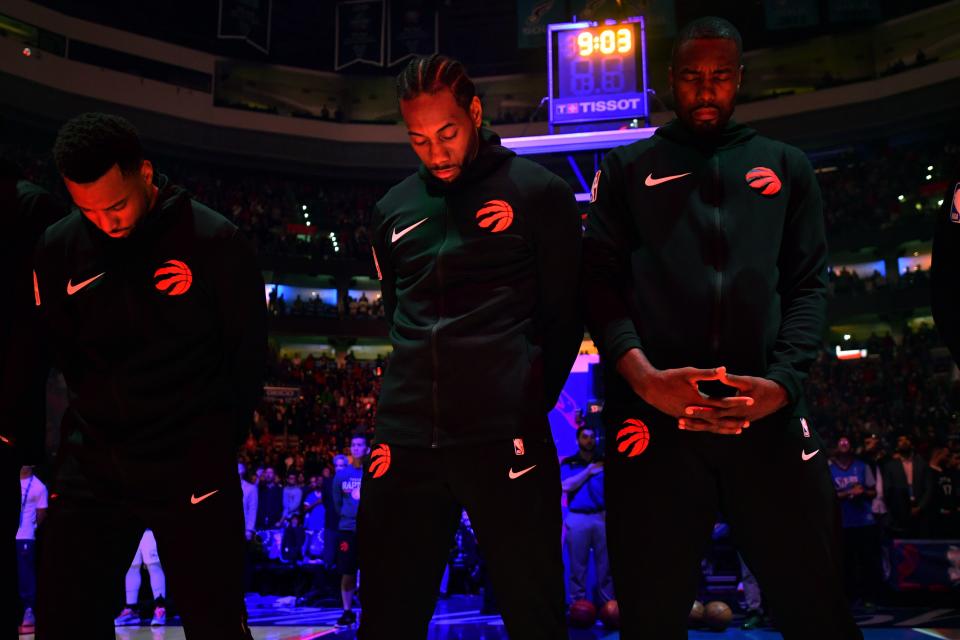How Valuable Is Kawhi Leonard?
There’s stealth, there’s steady, there’s sneaky, and then there’s Kawhi Leonard. Midway through the playoffs, Kevin Durant has been the most lauded individual performer, and with good reason. He’s averaging 35.6 points and has gone for 50, 46, and 45. But Leonard may be faring even better. The Toronto Raptors star is putting up 32.3 points and 7.7 rebounds per game, playing his typical stellar defense, and single-handedly keeping his team afloat—all without calling the slightest bit of attention to himself. If Durant is at times understated or ethereal, Leonard seemingly deflects the spotlight, to the point where putting the two neck-in-neck feels, in spite of everything that we know to be the case, like a cognitive misfire.
Leonard is known as much for what he is not as what he is. He is the quintessential modern wing, a slasher with range who is equally comfortable playing in isolation or facilitating an offense, but shorn of all the dynamism we generally equate with that role. Leonard has preternatural ability to put himself, and his body, in the right place at the right time. He doesn’t come off as an improviser; he already has the answers worked out in advance and they’re generally the right ones. Leonard also doesn’t ooze virtuosity like Durant or James Harden. His movements are compact and economical, to such a degree that it’s easy to overlook his considerable athleticism. While Leonard makes a fair number of plays that could be highlights, the level of control that makes him at times unstoppable quashes the proverbial “wow” factor. The letter is there, but not the spirit; Leonard can take a jaw-dropping move and turn it into a just another day at the office.

1139772734
Ron TurenneDuring his time in San Antonio, Leonard’s muted game was frequently compared to uber-Spur Tim Duncan. But Duncan was clearly a master craftsman who put on a clinic every night. Leonard is a “still rivers run deep” kind of player whose brilliance is as much about absence as presence.
Leonard’s game lends itself toward elision. The public imagination has taken that analysis one step further and suggested that this is by design, or at least a function of Leonard’s temperament. This theory is backed up by one of the more on-then-nose anecdotes involving him: in 2017, with the Spurs offense sputtering, Gregg Popovich sat Leonard down and asked him to score more. Leonard was nonplussed; the request simply did not compute. But when Popovich explained that it was for the good of the team—that taking initiative, far from being egoism, was actually the only way to serve the collective—and Leonard immediately upped his production. The immediate move around stories like this was again to liken him to Duncan, whose unselfishness was the hallmark of his Hall of Fame career. Leonard, though, wasn’t being deferential. Popovich seemed to be asking him to be something he wasn’t, to see the game in an entirely different way, and only by framing it in familiar terms was Leonard even able to conceive of changing up his approach.
This view of Leonard, however idealized, also does him a gigantic disservice. The assumption that he’s somehow pure, or blissfully immune to all the temptations afforded a player of his caliber, is downright condescending. It casts Leonard as a holy fool who, if he has any self-awareness at all, devotes it almost entirely to ducking attention—itself a wholly naïve act. What throws a monkey wrench in this narrative, though, is the bizarre, and still quite hazy, circumstances surrounding his departure from the Spurs, a saga that at this point seems fundamentally unknowable. Regardless of the specifics, or the veracity of his injury, this was clearly a case of Leonard having a strong stance and sticking to it regardless of how it affected the team. There’s such a desperation to hold onto this version of Leonard that the entire thing was sometimes blamed on his “camp” getting in his ear and corrupting him. But as some of Popovich’s snarky comments at the time suggested, the mere fact that Leonard could have been susceptible to outside voices at odds with the Spurs’ goals spoke volumes, even if Leonard himself did not. Far from being a simpleton, or basketball automaton, or some kind of Zen practitioner who had attained a higher level of consciousness, Leonard turned out to be a person just like anybody else. No matter who was at fault in the situation, the saga made clear that he was human, both fallible and prone to behaving in ways that didn’t always conform to extrinsic logic.

1141553742
Jesse D. GarrabrantConveniently, all memory of this episode was soon swept under the rug. This was in part because no one knew what the hell had happened. But it also complicated the Kawhi Leonard narrative that most closely complemented, even rationalized, his in-game style, as if it were so unsettling that it required some explanation. While they can be highly entertaining, attempts to draw parallels between a player’s personality and their game are generally little more than psychoanalytic fanfic. In the case of Leonard, though, it’s a useful metaphor. He doesn’t play the way he does to avoid notoriety or acclaim; Leonard doesn’t want those things because, as evidenced by his game, he’s a master at trimming out the extraneous, refining his actions, and eliminating all bullshit to the point where it’s practically unconscious. It’s not that Leonard doesn’t know any better. He knows, but has trained himself to not bother with it because he knows what the right move is. Cast in this light, his standoff with the Spurs doesn’t come across as a fall from grace, or as someone learning to assert himself. For whatever reason, Leonard was over it. He was done. And he was uncompromising because he knew what he wanted.
Leonard will again be a prime topic of conversation this summer, when he’s slated to hit the open market as a free agent. While Durant will be the biggest free agent of the offseason, Leonard won’t be far behind, and there’s a strong case to be made that he’s just as valuable—if not more valuable than—Durant, who is by general consensus the best basketball player in the world. Early speculation has attempted to hew to the familiar characterization of Leonard as endearingly loyal and benignly eager to do what’s good and right. The Raptors are thought to have a very good shot at re-signing him because Leonard supposedly embodies the values many people would like NBA players to hold. But what Leonard views as absolute and non-negotiable—his ability to intuit exactly what makes sense on the court—isn’t necessarily the same as what’s suggested by the fantasy projected onto him.
Maybe Leonard, far from being a disingenuous, is kind of a know-it-all. Maybe what’s been interpreted as simple is in fact a highly introspective, and altogether canny, form of cool. It’s certainly the way his game is constructed; why not apply the same lens to how we interpret him as a person? What if, when Popovich asked him to score more, Leonard wasn’t so much baffled as he was taken aback? To fully make sense of what happens this offseason, and to have the slightest chance of predicting it, we’ll need to accept that everything we want to believe about Leonard could be wrong. Otherwise, when he makes his choice, we could find ourselves at a loss: how could he do this when we wanted so badly for him to stand for certain things? Leonard will make his choice and do so unapologetically. He knows he won’t be letting anyone down. And the more we to cast him as someone who would be letting us down, the more disappointed we’ll be by an athlete who should only be measured by—and who only wants any part of—what he does on the court.

